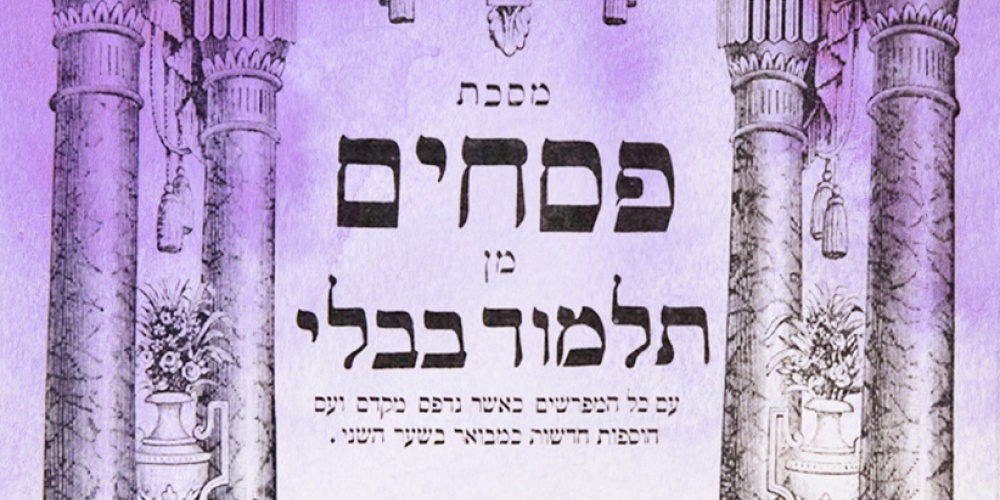
“On the eve of Pesachim, one may not eat adjacent to mincha time until it gets dark; even a poor person of Israel should not eat until they lean; and they must not give [the poor] fewer than four cups of wine even [if they need to take] from the tamchui, the charity plate” (Pesachim 99b).
The tenth and concluding chapter of masechet Pesachim discusses the laws of the seder night. Interestingly, it begins with three laws relating to food preparation for the seder. The mitzvah of sippur yetziat Mitzraim will have to wait.
That one should not eat too much on erev Pesach was the subject of our last post. That one should not eat unless and until one leans is meant as a demonstration of our royal status. In Mishnaic, i.e., Roman times, the nobility would eat while reclining on fancy sofas[1]. This had little to do with Pesach per se and was the practice of the nobility all year round. Hence, it was not included in the Mishna’s listing of the four questions. It was added only after the destruction of the Temple when the question regarding why the korban pesach must be eaten roasted was no longer applicable, and leaning was no longer the norm and hence, something unique to Pesach night[2].
So deep was the connection between wealth and leaning that the Mishna specifically mentions that even the poor must lean. As the Tosafists (Pesachim 99b, s.v. v’afeelu) explain, one might have thought that “the leaning of the poor is not considered leaning because they do not have on what to lean, and this would not be a demonstration of freedom”.
The Mishna is thus teaching that despite the fact that the poor person has no proper couch upon which to lean such that it is hard to call this leaning at all, nonetheless, on Pesach night all are to lean, even if in a makeshift way. Yet one can also understand this Mishna psychologically. Even if this poor person has a beautiful couch for Pesach—hopefully someone invited him to their home—the leaning is rather artificial and meaningless, perhaps even harmful. Contrasting his state of poverty with the wealth he witnesses and momentarily experiences could be depressing. Nonetheless, these potential arguments are rejected by the Mishna. On Pesach night, we are all royalty—even if only momentarily and fictitiously.
Yet the Tosafists offer another reading of the Mishna. “Even a poor person” is not to be read as the introduction of the law regarding leaning, but as the conclusion of the opening law, which would then read, “On the eve of Pesachim one may not eat adjacent to mincha time until it gets dark—even a poor person of Israel”. According to this reading, the Mishna, in the words of the Tosafists, teaches that “even a poor person who has not eaten for a few days should not eat until dark”.
Presumably, Tosafot do not mean these words literally. If one has truly not eaten for a few days, it would be a cruel application of the law to insist that one observe this “hiddur mitzvah”, beautification of a mitzvah (and not even a law in its own right), of not eating before the seder (see Rashi, s.v. lo yochal).
Perhaps those who interpret the Mishna as referring to leaning do so because they feel that the poor should eat whenever they can[3]. Even if a poor, hungry person is lucky enough to have a nice meal erev Pesach, it is unlikely to spoil one’s appetite for the seder. Presumably, what Tosafot does mean is that even one who may have had very little to eat and is quite hungry should wait just a bit longer to eat until we reach shulchan orech. While Tosafot do not explicitly say so, it would appear that according to this reading of the Mishna, the poor are not required to recline. Leaning while lacking either or both the physical luxury and mental ability could be seen as a meaningless gesture, so divorced from reality as to be viewed as mocking the poor.
Despite the fact that leaning is no longer the norm—and may even be uncomfortable for our style of eating—and despite the fact that, for much of our history, the notion of celebrating our freedom could be seen as a cruel joke, Jewish people, whatever their material wealth, have continued to lean. Even when lacking physical freedom and safety we retained our dignity, maintaining our faith that next year will be better. The Romans who destroyed our Temple and exiled our people could not destroy our spirit. We even had the chutzpah to adopt their eating practice as we celebrate the eternity of the Jewish people.
[1] Scholars have long noted the similarities—and differences—between the seder and the Greco-Roman feasts of the day. See here for example.
[2] By the Middle Ages, possibly much earlier, leaning had become so unnatural and uncommon that the Ravya, living in 12th century Germany, rules there no longer is a mitzvah to lean at the seder.
[3] The importance of not making the poor wait to eat can be seen in a beautiful ruling of the Mishna Berurah (Orach Chaim, 639:35) on the first night of Sukkot. With a debate as to whether one is exempt from eating in a sukkah on the first night if it is raining, suggests we wait an hour or two for the rain to stop and then eat. However, if such a wait will minimize the joy of Yom Tov for the family, they should eat immediately, even if this means missing the Biblical mitzvah of eating in the sukkah. If this is true of a well-to-do household, how much more is this the case when one has guests—i.e., poor people—over for the meal.



